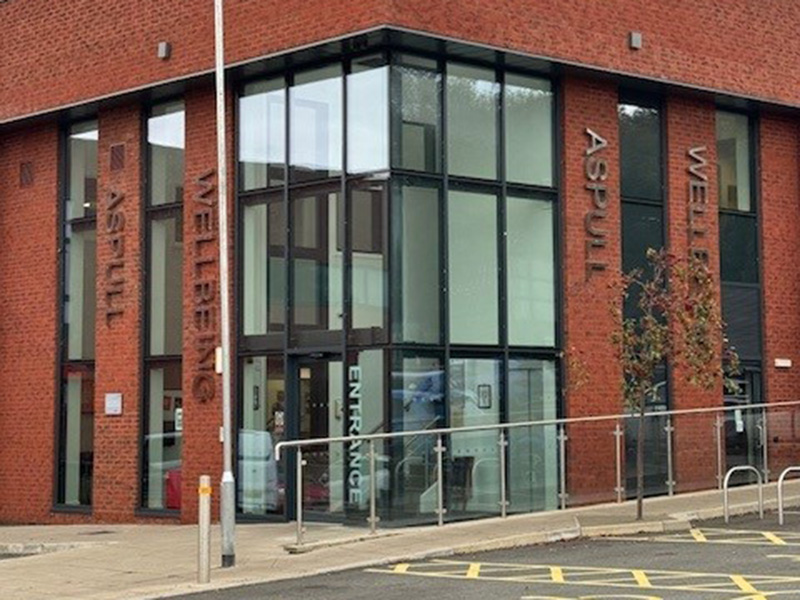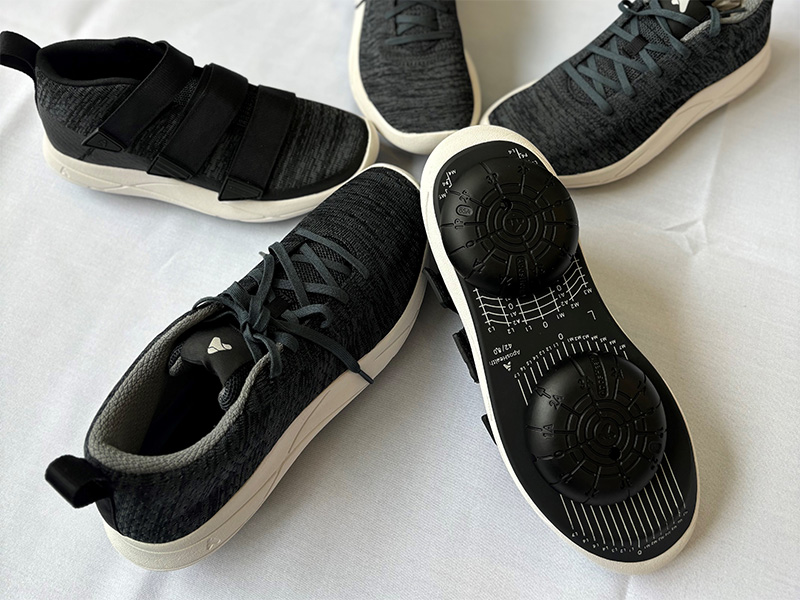Clinically Led, Cost-Neutral Innovation with APOS®
How Value Based Procurement enabled APOS® adoption at Aspull Health and Wellbeing Centre, delivering £156,000 savings and a 6:1 return on investment
In this case study we’ll describe how a trust has been able to deliver significant cost savings and improve patient outcomes through using the products as part of their front line orthotics services to their local community.
Using existing budgets, the orthotics service in the Aspull Health and Wellbeing Centre, part of Wrightington, Wigan and Leigh NHS Foundation Trust, successfully adopted Apos® footwear.
Savings of £156,000 were achieved from the first 33 patients, with a forecast of between 60 and 100 patients per year, delivering a 6:1 return on investment.
This Value Based Procurement (VBP) approach improved patient outcomes, choice and productivity. It also aligns with the NHS Fit for the Future: 10 Year Health Plan for England.
This study serves as a financial blueprint for other trusts seeking to adopt the Apos® innovation whilst utilising existing budget allocations.
Enquire Now About Apos®
Complete our two minute enquiry form and your regional Care Pathway Specialist or Clinical Care Pathway Manager will respond with further details.
Overview

With over 5,000 active patients, the orthotics service at Aspull Health and Wellbeing Centre continually seeks innovative solutions to improve outcomes for patients living with chronic musculoskeletal conditions and has long been recognised for its commitment to patient-centred care and clinical excellence.
Our service has a proud heritage; we are constantly looking for ways to improve patient care and outcomes. We realised there was a specific cohort of patients trapped in cycles of pain, with limited choice of options and at a significant ongoing cost to the NHS.
Embedding Apos® within the Knee Osteoarthritis Pathway provides patients with a non-surgical option that offers significant pain relief and quality of life improvement,
The Care Pathway Team at NHS Supply Chain supported us to build a financially sustainable model for Apos® Their support gave us the tools to demonstrate value, manage costs, and scale the service using existing resources.
Emma Lawler, Service Manager, Wrightington, Wigan & Leigh NHS Foundation Trust
The Challenge
There have been limited non-surgical options for patients who meet the criteria for total knee replacement, however, may not wish to take a surgical route or may not be suitable for surgery; these patients had limited non-surgical options prior to the implementation of Apos®.
Patients unsuitable for surgery were typically offered 2- 3 rounds of alternative solutions over a three-year period. Each carrying significant cost with limited long-term benefits.
Non-surgical options previously used include:
- Unloader braces: at a cost of £385 per brace, plus yearly replacement pads / straps of £60 per set.
- Physiotherapy appointments: £150 per session and often entail ongoing multiple appointments.
- Corticosteroid injections: at an approximate cost of £48.52 which are administered as an ongoing treatment.
In contrast, Apos® delivers improved outcomes at a fixed cost of £816 + VAT per patient. The Apos® device requires no additional product spend as all replacement parts are included in the above cost.
See our Useful Links section to view the NICE Guidance that supports the use of the Apos® device.
As an orthotist, my priority is delivering clinically effective and sustainable interventions that improve patient outcomes. AposHealth® provides a biomechanical solution that targets the root causes of knee osteoarthritis symptoms through gait modulation and neuromuscular re-education. Our early clinical outcomes demonstrate significant pain relief and functional improvement, particularly for patients with limited surgical options. Importantly, this approach fits within existing budgets without compromising clinical care, offering a scalable, evidence-based and NICE-guideline recommended alternative to traditional bracing.
Adam Ball, Orthotist, Wrightington, Wigan & Leigh NHS Foundation Trust
The Solution

To provide an alternative option; the team evaluated Apos®, a biomechanical device designed to improve function and reduce pain through gait modulation and neuromuscular re-education.
The decision to trial Apos® was driven by a clear clinical desire to improve outcomes for this underserved group of patients, while maintaining a neutral impact on the service’s budget.
Outcome-Based Referrals: Patients are assessed holistically, ensuring the most appropriate clinical management for the individual.
Structured Follow-Up: The model includes one initial 30 to 60-minute fitting appointment, followed by a 30-minute review based on clinical need. From 6-months, patients are place on patient-initiated follow-up supporting, long-term outcomes without increasing clinic burden.
Health Inequality Focus: By offering Apos® to patients previously underserved by traditional options, the services is addressing health disparities in musculoskeletal care.
The Results
Implementation and Early Insights
Initial results demonstrated rapid improvements in patient mobility and pain reduction, validating the decision to integrate Apos® or a specific cohort of patients. These outcomes were achieved without increasing the services overall spend.
See our Useful Links section for Jeff’s story – hear directly from a patient and clinicians about the impact of Apos®. This video has been created by Health Innovation Manchester, in partnership with the Orthotics Team.
Apos® is now a core part of the knee osteoarthritis pathway within the trust, with clear criteria for use.
Initial results across 33 patients show that the service has delivered measurable improvements in pain, mobility, and quality of life, without increasing the overall service budget.
The approach has also delivered £156,000 in confirmed savings, reinforcing the financial and clinical value of embedding Apos® as a cost-neutral innovation.
Financial Sustainability: A Neutral Cost Model
Reallocating resources based on value – Apos® can offer greater benefit for patients less suited to traditional bracing, supporting a Value Based Procurement approach aligned with the NHS Long Term Plan.
Free Replacement Parts: AposHealth® offers a total cost model that includes training, implementation and lifetime supported with replacement parts at no additional cost.
Freed-Up Capacity: Streamlined care pathways have reduced administrative and clinical time.
System-Wide Savings: Increasing capacity for access to physiotherapy, pain management, GP appointments, and prescriptions. The service has expanded from 4 to 5 clinic days per week using existing resources, demonstrating scalability without additional investment.
Patient Outcomes: Real Stories, Real Impact
- Patient A: Previously reliant on three different braces, experienced significant pain relief and functional improvement with the Apos® device. Theis enabled the patient to continue employment and provided significant improvement to their activities of daily living.
- Patient B: After years of bilateral bracing, leaving the patient in constant pain, the patient’s mobility and quality of life improved dramatically within weeks of wearing Apos®.
Driving Innovation Through Patient Insight
In June 2025 Health Innovation Yorkshire and Humber published a Patient Insight and Experience report which provides patient-led insights into the lived experience of knee osteoarthritis patients.
Through in-depth interviews the study gives detail of five key themes from the patients at various stages of the Total Knee Replacement (TKR) pathway.
- Impact on daily life and independence
- Emotional and psychological burden
- Frustrations with the NHS care pathway
- Hesitancy and barriers around TKR surgery
- Interest in and limited awareness of APOS® a medical shoe, as a non-surgical alternative.
See our Useful Links section for the full report – the findings reveal a strong patient desire for earlier, more holistic, and less invasive interventions.
By utilising APOS® there are several socio-economic benefits:
- Improved health and reduced pain allow individuals to participate more fully in social and recreational activities.
- A healthier society contributes more to the economy, making pathway optimisation a valuable investment; the use of APOS® for Knee Osteoarthritis patients can enable individuals to return to work or continue working where their condition might otherwise have prevented employment.
Next Steps
The Care Pathway Team at NHS Supply Chain support trusts to adopt innovation and improve the Knee Osteoarthritis pathway, working closely with NHS trusts and the Health Innovation Networks supported by APOS®.
The Care Pathway Team offer:
- Pathway design and implementation guidance
- A Productivity and Efficiency Calculators to model return on investment
- Access to clinical case studies and video testimonials
- A trust specific tailored walkthrough of the APOS® Health model.
Complete this short form to be connected by your regional Care Pathway team, who will guide you through the current Value-Based Procurement opportunities including this musculoskeletal (MSK) solution.
If you would like to contact the clinical team at The Aspull Health & Wellbeing Centre for further discussions or advice:
Emma Lawler emma.lawler@wwl.nhs.uk
Enquire Now About Apos®
Complete our two minute enquiry form and your regional Care Pathway Specialist or Clinical Care Pathway Manager will respond with further details.
Links section
-
NICE Recommendations
View the NICE recommendation here.
-
Jeff's story - treating osteoarthritis in Wigan using the Apos® device
Apos® is a non-invasive device worn on the feet to reduce pain and improve function in patients with knee osteoarthritis.
-
Knee Osteoarthritis: Patient Insight and Experience report
This report provides patient-led insights into the lived experience of knee osteoarthritis across the Yorkshire and Humber region.
-
Innovative medical device supported by MTFM Policy
Press Release - innovative medical device to reduce pain in knee osteoarthritis, now supported by MedTech Funding Mandate (MTFM).
-
Care Pathway Team
Helping improve the link between procurement and clinicians and driving the adoption of innovation.

